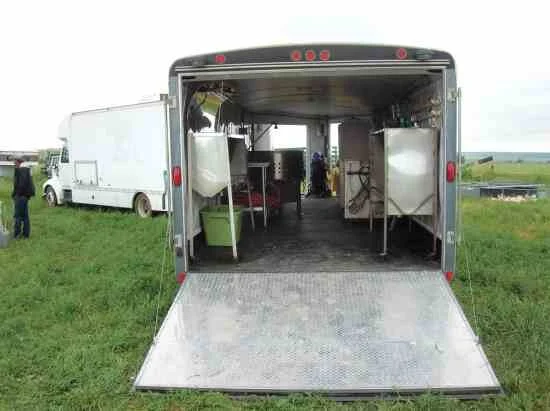
The best time to plant a tree was 20 years ago.
The second best time is today.
Phase 1 Projects
Indigenous Orchards
A multi site orchard project utilizing perennial plant species native to Ferry County to produce high value crops with exceptional value added potential. These orchards are multi crop, organic, and designed with natural depredation factored in. They are designed to mimic the best aspects of a natural forest ecosystem and based on sound environmental science. These orchards use only natural soil amendments and use no pesticides or herbicides, instead relying on the native animal species to control insects and undergrowth, providing a healthy living environment for native species and a healthy working environment for people.
Photo By U.S. Department of Agriculture
Mobile Small Animal Processor
One of the biggest barriers to market in small, rural communities is access to certified processing facilities. In many places bringing your animals to market entails paying for certified transport to an authorized slaughter facility and then being forced to pay the processing fee per animal. With a mobile processing facility, the livestock can be processed at the farm site using the utilities and labor already present. This saves the farmers money, reduces stress on the animals, and ensures a more quality product is brought to the end customer.
Floating Agriculture
Taking a page out of the ancient agricultural notebook and backing it with data gathered by multiple scientific bodies in multiple countries around the world, we are designing and implementing a floating agricultural system that uses natural and compostable growing media to grow food crops on local water bodies while aiding in abating eutrophication and addressing the issue of food insecurity in Ferry County. The goal is to create a system that is easily duplicated and expanded, produces no waste product, reduces water usage for agriculture, utilizes a growing medium that is also a nitrate and phosphate capture point, and creates a healthier watershed for all the life in our community.
Phase 2 Projects
Mobile Vegetable Processors
Much like small animal ranchers, many rural vegetable and fruit farmers find themselves lacking the certified processing facilities necessary to comply with local health regulations. Without these facilities the available sale options for farmers are limited. This narrowed market becomes a barrier to success that many farmers find themselves unable to overcome. Access to mobile processing facilities allows these small farmers to develop value added products, become more self reliant, and expand their market to reach new potential customers.
Pasture Raised Quail
Quail eggs are a common dish served in many areas around the world. A side effect of this demand is that the majority of quail egg farms are designed with profits in mind and care little for the health and welfare of the birds. We believe this mentality is not only wrong but detrimental. Quail are a ground bird that behaves in much the same way as common fowl. Their compact size and dominant hunting nature make them prime candidates for a hybrid pasture/cage model. Utilizing predator resistant and bird friendly mobile coops we allow the quail to roam around digging, eating bugs, dusting themselves, and otherwise doing what it is that quail do. All the while they are breaking down dead foliage, fertilizing and turning the soil, and abating predatory insects including ticks and grasshoppers. The end result is a healthier environment and happier birds that require less supplemental feed than their unfortunate cage raised counterparts.
Cold Transport
One gaping hole in the logistics chain for farmers in Ferry County is a lack of cold storage transport, especially for smaller product volumes. Not having a reliable and available means of getting product to market forces many small farmers to relegate themselves exclusively to local buyers, denying them access to capital from more affluent areas. We intend to rectify this situation by developing a micro scale shipping fleet designed to consolidate crop shipments so that multiple farmers can split the cost of transport. A secondary benefit of this operation model is potential exposure of product to buyers willing to purchase from multiple producers creating a more efficient transport and marketing system.

The true meaning of life is to plant trees, under whose shade you do not expect to sit.
Nelson Henderson






